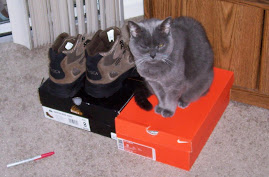I just recently came across this line in a Roy Blount book: S
ometimes I put too much energy into being pissed off. I had to write it down, because it seems to describe my life a lot lately. For me, though, I would amend it thusly:
I often put too much energy into being pissed off at things that I have no control over.
Take the weather. Please. February is traditionally the month when I get a bad case of Seasonal Affective Disorder (SAD) because I'm tired of the gray cold winter and ready for spring to start. But this February started off great: we had a beautiful snow storm on the evening of the 31st, covering the ground in a pristine white blanket 6-8 inches thick. The beauty of a snow storm is only matched by the beauty of a snow day, and Friday the college was closed, giving me a much-needed three-day weekend.
But then a warm front came in over the weekend, and Monday morning I was greeted by the thickest fog I've ever seen. This being my busy season at work, I had a 12-hour day at work on Monday. The fog didn't lift at all during the day, and by the time I drove home from work at 8:00 pm, I was driving on the highway through darkness in a fog so thick I could only see about two car lengths ahead of me. I couldn't see anything out beyond the car, only a tiny stretch of road in front of me that I took on faith would lead to another tiny stretch of road. It was one of the loneliest feelings I ever had, as if I were the only person left alive on Earth.
I made it home safely, but exhausted, after having given four library presentations, worked twelve hours, and driving an hour through the dark fog.
Although I got a full eight hours of sleep Monday night, I was still exhausted on Tuesday. It rained all day. I had two more library presentations, and then drove home into a torrential downpour and against blinding winds. That mostly pissed me off because it severely affected the miles per gallon on my Prius. I absolutely hate driving into the wind for that reason.
When I got home, I immediately tried to take a nap, because I had my tennis league that night and wanted to rest up for it. I rested, but didn't sleep much, for about an hour and a half, with a short break in between to eat dinner. When I got up and dressed for tennis, I didn't feel very rejuvenated.
I drove to tennis through another downpour. (Or rather, through the same one that I had driven home from work in.) Now I had to deal with flooding, since there were several places in the road with standing water. At one point I barreled through about 1-2 feet of water, but I made it through. When I got to the tennis center, I couldn't even turn into the road it was on, because there was about 3 feet of water blocking the entrance. A police car was also blocking the path, along with a tow truck and a line of cars. Like an obsessive compulsive chihuahua chasing its tail, I kept driving around in circles trying to figure out where to park or how to get into the tennis center. All the while I cursed the weather with a vehemence that was unnatural. I finally just parked on the side of the road with my blinkers on, marched through the mud (in my tennis shoes) to the building, and asked if there was anywhere I could park.
The guy at the tennis center said he had tried to call me at home, but I had already left. Due to the flooded parking lot, the league was canceled that night. So I got to drive back home in the rain and flood. Because of all the ponds in the middle of the road, I had to take several detours on the way. I finally made it home an hour after I had left. I was wet, angry, and inconsolable. I'd wasted my pre-tennis time napping in vain, I'd missed my only opportunity this week to play tennis, I'd spent a stressful hour driving around dodging the flood, and now it was too late to do anything fun before bedtime. But I still had a lot of energy to be pissed off.
I don't believe that I'm naturally a discontent. When I'm not sun-deprived, and things go according to plan, I love life. I probably even love the weather almost as often as I hate it. But I do not react well to unexpected adversity. I get angry. I kick at things that can't feel it, like the wind. And I scream at things that can't hear me, like the rain.
The only thing that saved me this week was my new Jimmy Buffett CD that accompanied me through the fog, rain, and flood.
I want to live in a Jimmy Buffett song.





.jpg)